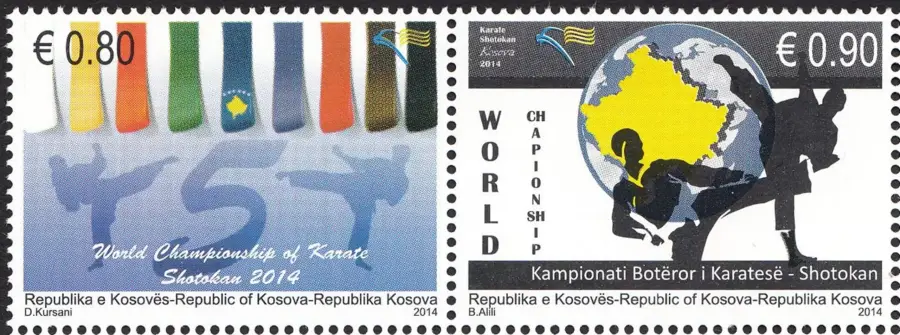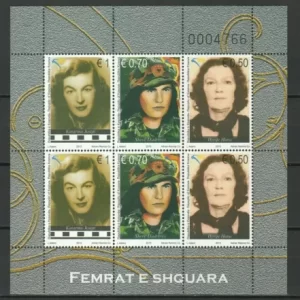Kosovo 2014 World Championships of Karate Shotokan MNH
Shotokan is one of the most widely practiced styles of karate, known for its powerful and dynamic techniques, emphasis on kata (forms), and focus on kihon (basic techniques). Here are some key aspects of Shotokan karate:
- Founder: Shotokan karate was founded by Gichin Funakoshi, often referred to as the “father of modern karate.” Funakoshi introduced Shotokan to mainland Japan from Okinawa in the early 20th century, where it gained popularity and spread internationally.
- Principles: Shotokan karate emphasizes the development of strong basics, including stances, punches, kicks, and blocks. Practitioners focus on kihon (fundamental techniques), kata (prearranged forms), and kumite (sparring) as essential components of training.
- Kata: Kata are prearranged sequences of movements that simulate combat against imaginary opponents. Shotokan karate includes a wide range of kata, each with its own unique techniques and applications. Practicing kata helps students develop proper form, timing, and coordination.
- Kumite: Kumite, or sparring, is an integral part of Shotokan karate training. It involves both prearranged and freestyle sparring drills designed to develop timing, distance, and control. Shotokan practitioners typically start with basic drills and gradually progress to more advanced techniques and strategies.
- Dojo Etiquette: Shotokan karate places a strong emphasis on dojo etiquette and traditional Japanese customs. Students are expected to bow upon entering and leaving the dojo, show respect to their instructors and fellow students, and adhere to the principles of courtesy, humility, and discipline.
- Belts and Rank: Like many martial arts, Shotokan karate uses a belt ranking system to indicate a practitioner’s level of skill and experience. Beginners typically start with a white belt and progress through various colored belts (kyu ranks) before attaining black belt (dan) ranks. Advancement through the ranks is based on proficiency in techniques, kata performance, and understanding of karate principles.
- Competition: Shotokan karate practitioners have the opportunity to compete in tournaments at local, national, and international levels. Competition formats may include kata, kumite, and team events, allowing practitioners to showcase their skills and test themselves against others.
Shotokan karate continues to be practiced and taught worldwide, with millions of practitioners of all ages and backgrounds benefiting from its physical, mental, and spiritual aspects.










Reviews
There are no reviews yet.